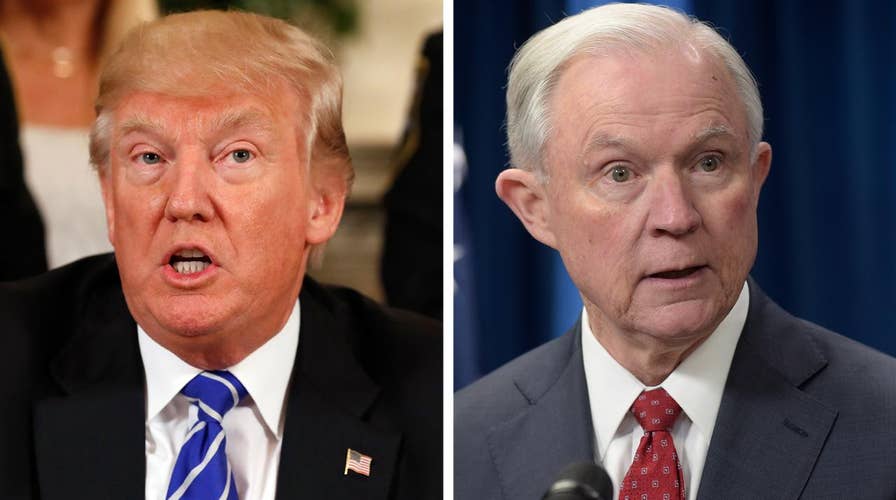How the DOJ 'watered down' Trump's travel ban
Judge Napolitano on what needs to be done to the fix the executive order
The 9th Circuit Court of Appeals on Monday ruled in part against President Trump’s so-called travel ban, upholding an injunction that prevents the administration from enforcing a suspension on travel from six mostly Muslim countries.
"We conclude that the President, in issuing the Executive Order, exceeded the scope of the authority delegated to him by Congress," the opinion said.
The ruling Monday from a unanimous three-judge panel of the 9th U.S. Circuit Court of Appeals deals the administration another legal defeat as the Supreme Court considers a separate case on the issue.
The judges say the president violated U.S. immigration law by discriminating against people based on their nationality and that Trump failed to show their entry into the country would hurt American interests.
In a statement, Attorney General Jeff Sessions said the Justice Department disagreed with the decision, adding that the order was "well within [Trump's] lawful authority to keep the Nation safe."
The judges did not rule on whether the travel ban violated the Constitution's ban on the government officially favoring or disfavoring any religion. The 9th Circuit, considered among the most liberal circuits in the country, did side with the administration Monday in allowing the government to review vetting procedures. The judges directed a lower court to re-issue its preliminary injunction following the new guidance.
The 9th Circuit opinion represents just one development in the fast-moving legal battle.
The 4th U.S. Circuit Court of Appeals in Virginia also ruled against the travel ban May 25. The administration has appealed that ruling to the Supreme Court.
Earlier Monday, lawyers for Hawaii also told the Supreme Court that letting the Trump administration enforce the ban would "thrust the country back into the chaos and confusion" that resulted when the policy was first announced in January.
The state urged the justices to deny the administration plea to reinstate the policy after lower courts blocked it. The high court is considering the administration's request and could act before the justices wind up their work at the end of June.
Under the Trump policy, immigration officials would have 90 days to decide what changes are necessary before people from Iran, Libya, Somalia, Sudan, Syria and Yemen may resume applying for visas. The U.S. refugee program would be halted for 120 days.
It would take a majority of the Supreme Court, at least five justices, to put the policy into effect.
The 9th Circuit weighed in Monday after a federal judge in Hawaii already blocked the ban.
Trump signed his first executive order on travel a week after he took office in January. It applied to travelers from the six countries as well as Iraq and took effect immediately, leading to commotion at U.S. airports as the Homeland Security Department scrambled to figure out who the order covered and how it was to be implemented.
A federal judge blocked it eight days later.
In March, Trump issued a narrower order, but federal courts that have examined it so far have blocked it as well.
On Twitter last week, Trump said the "courts are slow and political" and he said the government already is "EXTREME VETTING people coming into the U.S."
The Associated Press contributed to this report.













































